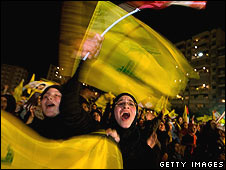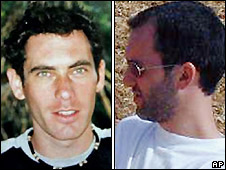|
|
By Crispin Thorold
BBC News, Beirut
|

It was a day of great emotion on both sides of the Lebanese-Israeli border.

Qantar's release has been welcomed by many Hezbollah supporters
|
In Israel it was a day of grief and anger but in Lebanon triumph and defiance have dominated.
That sense of victory was particularly strong at the Hezbollah rally in the southern suburbs of Beirut.
Tens of thousands of people were packed into a square carrying the yellow and green flags of Hezbollah, as well as the Lebanese national flag.
The loyalty of the Hezbollah faithful was rewarded by a rare public appearance of the leader of the movement, Hassan Nasrallah, who was there to greet the five militants who were released by Israel earlier in the day.
"The age of defeats is gone, and the age of victories has come," said Sheikh Nasrallah. "This people, this nation gave a great and clear image today to its friends and enemies that it cannot be defeated."
The most controversial of the detainees to be released was Samir Quntar. This man is reviled in Israel. He was jailed in 1979 for killing a four-year-old Israeli girl and two other people.
"I returned today from Palestine but believe me I will not return until I go back to Palestine," Samir Quntar said. "I promise my people and dear ones in Palestine that I and my dear comrades in the valiant Islamic resistance are returning."
Momentary unity
This has been a day when the five former detainees have been given a hero's welcome in their homeland. After being transferred into Lebanon in Red Cross cars they soon changed into military fatigues.
The men walked along a red carpet to the tune of martial music. There were similar scenes in Beirut where they were officially greeted by a "Who’s Who" of Lebanese politicians, including the president, the prime minister and the speaker of the parliament.
 |
 This exchange will not lead to any rapprochement between the two sides
This exchange will not lead to any rapprochement between the two sides

|
That was particularly significant as these three leaders are from different Lebanese political factions as well as different sects. This was, superficially at least, a moment of unity in a country that is deeply divided.
In reality though, the day was more about Hezbollah than it was about Lebanese unity or the men who were released.
Since the Israeli withdrawal from southern Lebanon in 2000, Hezbollah has vowed that it would secure the freedom of all Lebanese prisoners in Israeli jails. It was one of the two reasons that the group gave for its continued "resistance" against Israel.
Now that objective has been achieved and the movement is likely to remember the events of the day as a great victory, which they will compare to the Israeli withdrawal from Lebanon.
It is also the symbolic end of the 2006 war between Israel and Hezbollah. That conflict began on July 12th when Hezbollah fighters ambushed an Israeli patrol. They kidnapped Ehud Goldwasser and Eldad Regev the two Israeli soldiers whose bodies were returned on Wednesday.
Hezbollah say they carried out that attack to try to secure the freedom of Lebanese detainees in Israeli jails. Israel went to war to get the soldiers back and to punish Hezbollah for the raid into Israel.
'Resistance' continues
A senior Hezbollah official has now told the BBC that the soldiers were captured alive. The official claims that they were injured in the cross-border attack but that they subsequently died.
That information cannot be independently verified and it was not even known until the coffins arrived at the border in the morning whether the soldiers were alive or dead.

Eldad Regev (left) and Ehud Goldwasser were captured in 2006
|
If the prisoner exchange is a victory for Hezbollah, as the group claims, it has come at a great cost to Lebanon and Israel. More than 1,125 Lebanese people and nearly 160 Israelis died in the war.
This exchange will not lead to any rapprochement between the two sides. Hezbollah retains its weapons and says that it has the right to continue its "resistance" against Israel. It is also demanding that a small area of land the Shebaa Farms which Israel occupied in 1967 be handed over to Lebanon.
That territory is disputed internationally and until its status is resolved Hezbollah will continue to argue that it has the right to fight Israel.
On the Israeli side, there also appears to be no appetite for any sort of broader deal with Hezbollah. Israel and Syria are holding indirect negotiations through Syrian mediators and it is unlikely that there will be talks, let alone a deal, between Lebanon and Israel until the Syrian track progresses.
|
Bookmark with:
What are these?